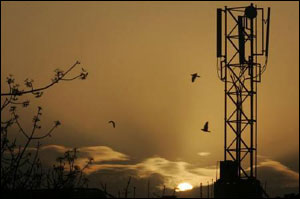 | « Back to article | Print this article |
With a mobile penetration of around nine per cent and a $60-million market, among the smallest in the world, you might wonder why Myanmar has become such a hot spot for global telcos. After all, it’s a market that’s smaller than even Jammu & Kashmir (6.67 million subscribers).
 Last week, Bharti Airtel and 16 other global telcom service providers, including Telenor, Singtel, and ST Telemedia, filed their expressions of interest (EoIs) for two mobile licences that the country’s government put on offer for foreign telcos, the first time ever.
Last week, Bharti Airtel and 16 other global telcom service providers, including Telenor, Singtel, and ST Telemedia, filed their expressions of interest (EoIs) for two mobile licences that the country’s government put on offer for foreign telcos, the first time ever.
Decades of military rule kept the country closed to foreign investors, including in telecom services, which was a state monopoly available at exorbitant tariff. But, the new government under Thein Sein last year offered foreign companies two mobile licences under a liberalised foreign direct investment policy that permits 100 per cent foreign ownership.
Myanmar is attractive for telcos, also because it has set an ambitious target of increasing telecom penetration to 80 per cent by 2016 (fixed-line penetration at present is only one per cent, taking the total penetration level to 10 per cent). It means the country would, over three years, add around 45 million mobile telecom customers - nearly the current size of Delhi’s GSM mobile market. It also means building thousands of km of fibre infrastructure and setting up more than 15,000 towers (it has only 1,800 towers at present) which, according to Deloitte, would require over $4-billion investment.
For Bharti, whose subscriber growth has slowed in India (at 185 million), Myanmar could become one of its largest markets in South Asia. The company has over 7.4 million customers in Bangladesh and Sri Lanka put together. A control over even half the Myanmarese mobile market (3G has also been introduced) would give the company a sizeable number in the region.
The Indian telco could replicate the low-cost model it has very effectively used in Africa, making mobile telephony in Myanmar affordable. At present, SIM card registration in the country costs a customer a staggering $150-350 (around Rs 7,900-18,600) and tariffs are at a steep $0.30 (about Rs 16) per minute - the rates similar to those in India in the early 1990s. Also, 70 per cent of the nation’s population lives in rural areas; but mobile coverage is restricted mostly to bigger cities.
However, even as the market offers big opportunity, there are challenges, too, such as a relative instability in the country, lack of independent telecom regulatory system, doubts whether investments would be safe in the light of growing corruption, etc. Only a few days ago, a deputy minister in the country’s telecommunications ministry was forced to resign over allegations of graft in buying SIM cards. This threatened to derail the liberalisation attempt and the deadline for filing EoIs for the two mobile licences was pushed.